Natalie Portman, 1981-
Jerusalem-born actress Portman made her film debut as the star of 1994’s “Leon: The Professional.” She won an Oscar for 2010’s “Black Swan” and was nominated for two others. Her directorial debut was the 2015…

Jerusalem-born actress Portman made her film debut as the star of 1994’s “Leon: The Professional.” She won an Oscar for 2010’s “Black Swan” and was nominated for two others. Her directorial debut was the 2015…
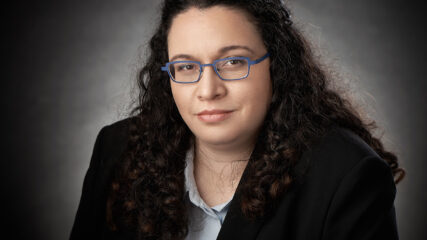
Sattath became the executive director of the Association for Civil Rights in Israel in November 2021 after 11 years leading the Reform movement’s Israel Religious Action Center. The rabbi also served as the executive director…
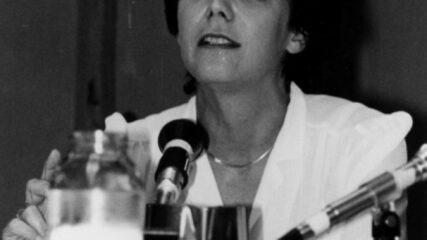
Shapira is a historian of Zionism and modern Israel and a professor emerita at Tel Aviv University. Her books include 2012 National Jewish Book Award winner Israel: A History and biographies of Berl Katznelson, David…

A lawyer and TV journalist, Tamano-Shata in 2013 became the first Ethiopian-born woman in the Knesset. She also is the first Ethiopian-born Cabinet member, serving as immigrant absorption minister since May 2020 under three prime…
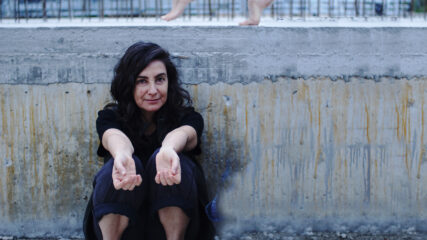
A dancer and choreographer, Wertheim is the artistic director of Vertigo Dance Company, founded with partner Adi Shaal in Jerusalem in 1992. They added a dance school in 1997 and in 2007 established the Vertigo…
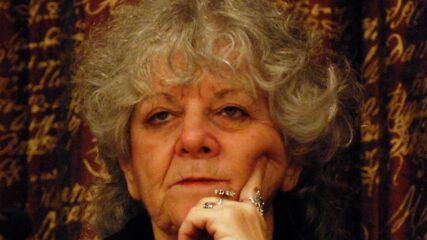
Yonath is the first Israeli woman to receive a Nobel Prize, sharing the chemistry prize in 2009 for work on ribosomes, which are crucial proteins in cells. She used X-ray crystallography to map ribosomes’ structure,…

Zoabi serves as an Arab member of the Knesset for Meretz and deputy speaker and is an activist for Arab rights. Forbes named her one of Israel’s 50 most influential women in 2018. She was…
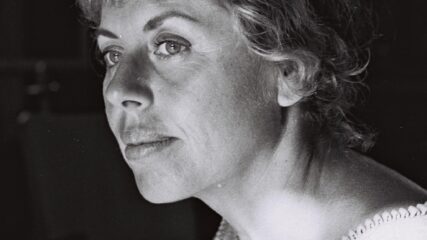
Founder of the Meretz party, Aloni was known for advocating for peace and for human and civil rights, especially as a voice for women and against Orthodox control of society. She fought in the Palmach…
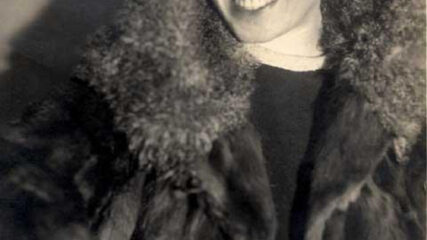
Born in Warsaw and known as Mita, Bat-Dori immigrated to the Land of Israel in 1923 and brought theater to kibbutzim as an actress, playwright and theater director. Her plays targeted political issues, such as…
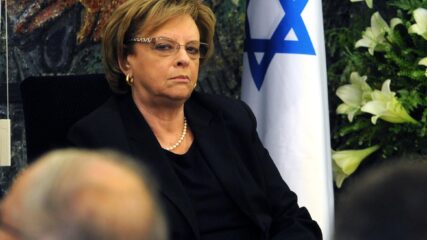
Beinisch became the first female president of the Supreme Court in 2006 after serving over 10 years as a justice. She also was the first woman to serve as state attorney, the highest nonpolitical role…
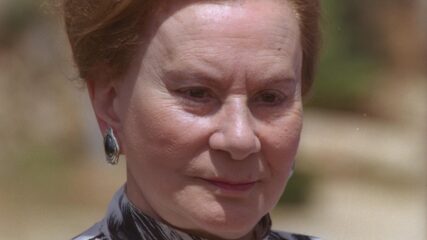
A native of Belarus who grew up in Lithuania and made aliyah in 1936, Ben-Porat in 1977 became the first woman appointed to the Israeli Supreme Court and the first to serve on the highest…
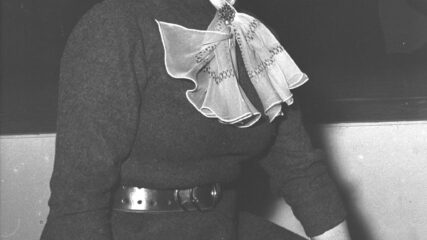
A New York-born opera singer, De Philippe founded the Israel National Opera Company in 1947. She settled in Palestine after World War II and performed with the Palestine Folk Opera in 1945 and for the…

Raised in Lithuania, Goldberg settled in Tel Aviv in 1935 and became a Hebrew poet, literary translator, and author of children’s books and plays. She referenced the effects of World War II on Jews in…

A singer, actress, and advocate for trans and gay rights, Goldstein in 1960 was the first trans Israeli woman to have sanctioned sex reassignment surgery. She co-founded the nonprofit organization Aguda in 1975 to help…
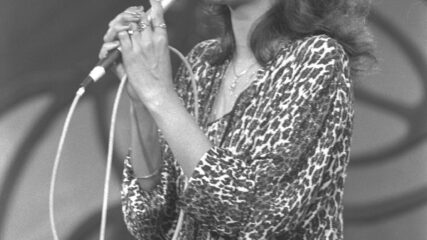
Born into a Yemeni family in Tel Aviv, singer Haza helped popularize Mizrahi culture. Her song “Ga’agu’im” (“Yearning”) launched her career in 1973. She was Israel’s Singer of the Year from 1980 to 1983 and…

One of Israel’s foremost choreographers and a 1973 Israel Prize winner, Levy-Tanai also produced plays and drew inspiration from her Mizrahi roots in her art. A Jerusalem native who was largely raised in orphanages, she…
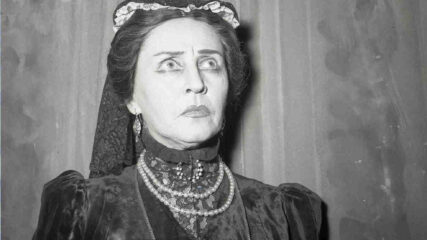
Called “the high priestess of the Hebrew theater” by a fellow actor, Belarus-born Rovina got her start onstage in Moscow with what became Israel’s national theater, Habimah. She was best known for playing Leah in…
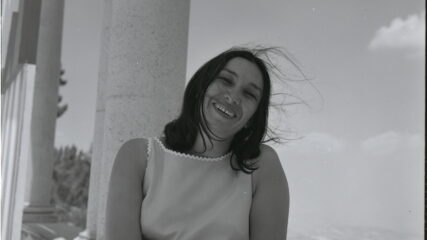
Singer-songwriter Shemer was considered the “first lady of Israeli song.” She wrote “Jerusalem of Gold” (“Yerushalayim Shel Zahav”) for the 1967 Israel Song Festival, and it became the anthem for a united Jerusalem after the…

Aaronsohn was born in Zikhron Ya’akov in Ottoman Palestine. After witnessing the Armenian genocide, she decided to help the British against the Ottomans in World War I with the Nili ring of Jewish spies, founded…

Bat-Miriam, born in Belarus, is considered one of the four “mother poets” of modern Hebrew. Her 1937 book, “Eretz Yisrael,” examines the Land of Israel as a woman. She wrote many poems about biblical women…
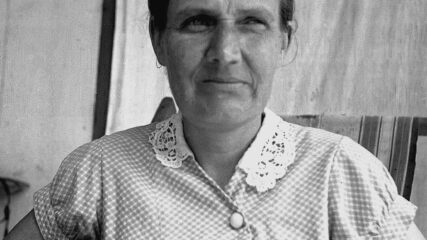
Bikhovsky, one of the “four mothers” of modern Hebrew poetry, often known simply as Elisheva, wrote about Zionism and antisemitism without biblical and rabbinical references. She was drawn to Hebrew as a Russian girl and…
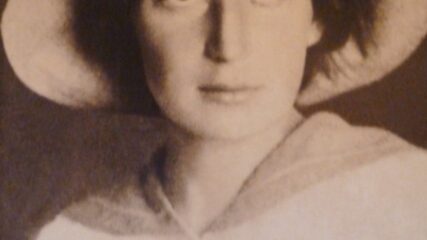
One of the four “founding mothers” of modern Hebrew poetry, known as Rachel the Poetess or simply Rachel, Bluwstein was born in Russia and moved to Ottoman Palestine in 1909. She wrote most of her…
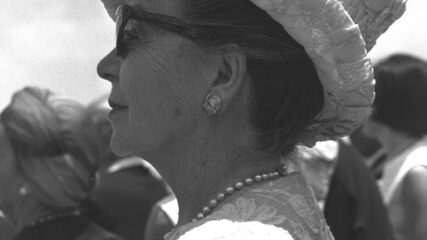
A two-time president of Hadassah, Halprin lived in Jerusalem in the late 1930s to serve as the Hadassah Medical Organization’s liaison during the construction of Hadassah Hospital at Mount Scopus. She spoke against violence during…
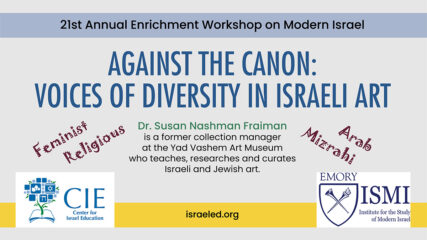
In less than 45 minutes, Israeli educator Susan Nachman Fraiman presents a taste of the variety of voices in Israeli art that have emerged in the past 20 years: female, religious, Mizrahi, Ethiopian and Israeli-Palestinian, all of which are rich subjects in themselves. We examine a few examples of works from each of these sectors and try to understand the rich background from which they come. This video is from a session July 25, 2022, at the 21st annual CIE/ISMI Enrichment Workshop on Modern Israel.